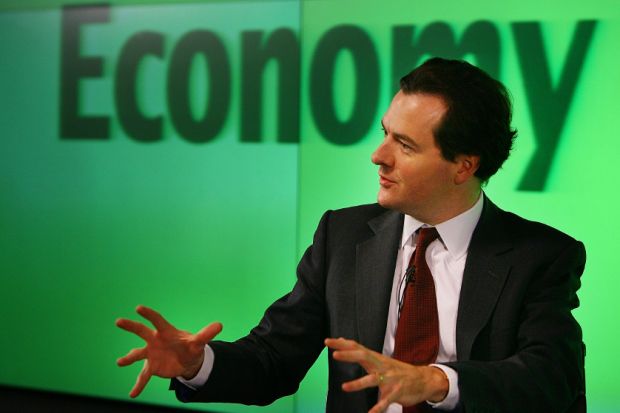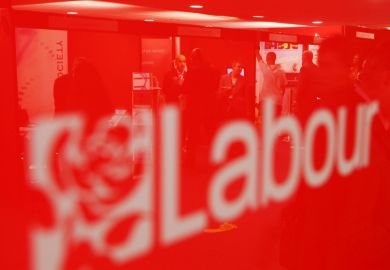Entering the Conservative conference in Manchester is a bit more lively than usual this year – being booed and called “Tory scum” are firsts for me.
At one point today that was the treatment for everyone going in from a very small group of protesters, although other journalists reported far worse yesterday.
One man outside told me I had to “leave my conscience and my principles outside” if I was going inside, and was interested in why I was there.
Our conversation involved me explaining that I was a journalist and that, no, contrary to what he thought, Times Higher Education isn’t part of the same company as the Times newspaper.
It’s hard not to focus on the atmosphere around the conference when, from a higher education perspective, not much has happened yet. Although its absence from the debate may be revealing in what it says about government attitudes and policies.
A speech by Sajid Javid, who is the secretary of state responsible for higher education and research, mentioned apprenticeships – but not universities or research. It was a speech on the economy, but you would think that a secretary of state with an interest in all elements of his brief might have made the connection between universities and growth.
Javid is the man who will decide the Department for Business, Innovation and Skills’ submission on cuts to the higher education and research budgets in the upcoming spending review. His speech was focused on politics rather than policy and echoed one of the main thrusts of the Conservative agenda at present – that the Tories are “the only party for working people and you’d better get used to it”.
The chancellor George Osborne’s speech, following Javid’s in the session on the economy, made no mention at all of science. That is a departure from previous speeches, in which he has talked about science being “a personal priority”.
There are suggestions from some in the sector that cuts to the research budget look like being part of BIS’ spending review settlement – and that the Treasury is saying even priority areas don’t get protection. So perhaps Osborne would rather not give any more quotes on science that might be used to embarrass him.
Nick Boles, the minister responsible for further education and skills within BIS, kicked off the economy session by chairing a panel discussion on apprenticeships on the main stage.
This involved him asking questions of a young apprentice introduced as Josh, including what advice he would give to people thinking of apprenticeships instead of university.
If there is competition within BIS between Boles and Jo Johnson, the universities and science minister, then the former has won in terms of stage time. Actually, Josh is beating Johnson on stage time too. Johnson will be appearing at higher education fringes, but not making a speech on the main stage.
The big push that the Conservatives gave to apprenticeships on the main stage might add weight to the theory that they are seen by the party as another form of competition for universities.
For his part, Johnson will be aiming not to create any news stories at the fringes – the teaching excellence framework is linked to fee rises, even if only with inflation at present, so it does raise some potential media problems (which may explain its absence from the main stage).
Perhaps he will also give some more detail about the Green Paper, and what areas it will go into beyond the TEF.
Megan Dunn, the National Union of Students president, will be appearing on the same panel as Johnson at some of the fringes – and it will be interesting to see what sort of public challenge she gives him on the government’s scrapping of maintenance grant, plans to freeze loan repayment thresholds and TEF-linked fee rises.
At the moment, the lack of even a mention for universities in the main hall – except as something less favoured than apprenticeships – might be seen as a worry.
And home secretary Theresa May’s speech is still to come.
Register to continue
Why register?
- Registration is free and only takes a moment
- Once registered, you can read 3 articles a month
- Sign up for our newsletter
Subscribe
Or subscribe for unlimited access to:
- Unlimited access to news, views, insights & reviews
- Digital editions
- Digital access to THE’s university and college rankings analysis
Already registered or a current subscriber?





